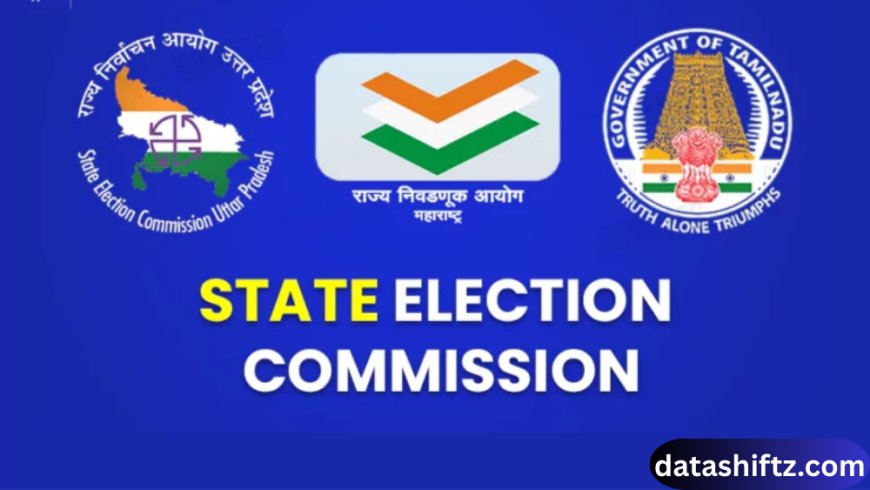State Election Commission: Guardians of Local Democracy in India

Introduction
In India's federal structure, elections are not confined to the national and state legislatures alone. Local self-governments, including Panchayats and Municipalities, play a pivotal role in grassroots governance. To ensure the smooth conduct of elections at this level, the Constitution of India mandates the establishment of State Election Commissions (SECs). These autonomous bodies are entrusted with the responsibility of administering elections to local bodies, thereby strengthening the democratic fabric at the grassroots level.
What is a State Election Commission?
Constitutional Mandate
The concept of a State Election Commission was introduced through the 73rd and 74th Constitutional Amendments in 1992. Articles 243K and 243ZA of the Constitution empower each state to establish its own SEC. These commissions are autonomous bodies responsible for the superintendence, direction, and control of the preparation of electoral rolls and the conduct of elections to Panchayats and Municipalities.
Structure and Composition
Each SEC is headed by a State Election Commissioner, who is appointed by the Governor of the respective state. The tenure of the Commissioner is typically five years, subject to a maximum age limit of 65 years. The Commissioner can only be removed from office under conditions similar to those applicable to a High Court judge.
Functions and Responsibilities
The primary functions of a State Election Commission include:
-
Conducting Elections: Organizing and overseeing elections to Panchayats and Municipalities.
-
Preparation of Electoral Rolls: Ensuring accurate and up-to-date voter lists for local body elections.
-
Delimitation of Constituencies: Defining the boundaries of electoral constituencies for local bodies.
-
Monitoring Election Campaigns: Implementing the Model Code of Conduct during election periods.
-
Registration of Political Parties: Recognizing and deregistering political parties at the state level.
-
Supervision of Election Officials: Appointing and overseeing the work of election officers and staff.
-
Dispute Resolution: Addressing complaints and disputes arising from the election process.
State Election Commissions Across India
Each state in India has its own SEC, which operates independently but in alignment with the Election Commission of India. Here is a snapshot of some prominent State Election Commissions:
| State | Established | Headquarter Location | Current Commissioner |
|---|---|---|---|
| Maharashtra | 1994 | Mumbai | [Name of Commissioner] |
| Gujarat | 1993 | Gandhinagar | Shri Sanjay Prasad |
| Jharkhand | 2001 | Ranchi | Devendra Kumar Tiwari |
| Madhya Pradesh | 1994 | Bhopal | Mr. Manoj Kumar Shrivastava |
| Kerala | 1994 | Thiruvananthapuram | [Name of Commissioner] |
| Delhi | 1993 | New Delhi | [Name of Commissioner] |
Recent Developments and Reforms
Technological Advancements
To enhance transparency and efficiency, many State Election Commissions have adopted digital platforms for voter registration, election results dissemination, and grievance redressal. For instance, the Maharashtra SEC has implemented a software system for the bifurcation of voter lists, facilitating smoother conduct of elections.
Capacity Building and Training
Recognizing the importance of well-trained election officials, several SECs have initiated training programs for Booth Level Officers (BLOs) and other election staff. These programs focus on voter education, the use of electronic voting machines, and the handling of election-related disputes.
Legal Reforms
Some states have introduced legislative measures to empower their SECs further. For example, Maharashtra has made it mandatory for all political parties to register with the State Election Commission for contesting local body elections, ensuring a level playing field.
Challenges Faced by State Election Commissions
Despite their constitutional mandate, State Election Commissions encounter several challenges:
-
Political Interference: Influence from state governments can sometimes undermine the autonomy of SECs.
-
Resource Constraints: Limited financial and human resources can affect the efficiency of election processes.
-
Voter Awareness: Ensuring that voters are informed about election procedures and their rights remains a significant hurdle.
-
Technological Barriers: In rural and remote areas, the lack of internet connectivity hampers the implementation of digital election systems.
Conclusion
State Election Commissions play a crucial role in India's democratic setup by ensuring the conduct of free and fair elections at the local level. Their independence and effectiveness are vital for the health of grassroots democracy. As India continues to evolve, strengthening the capacities and autonomy of these commissions will be essential for the inclusive and transparent functioning of local self-governments.






























